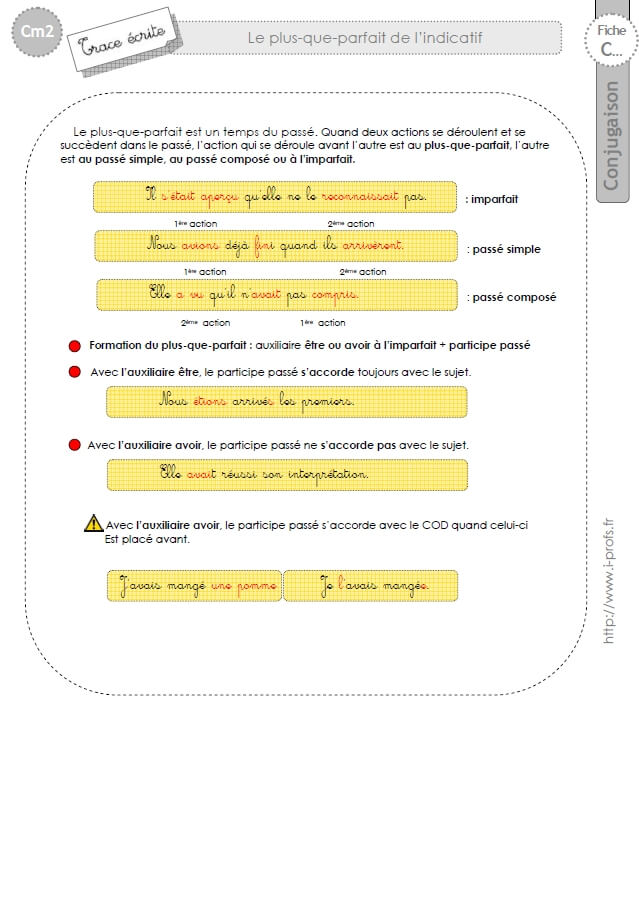

The cookie is used to store the user consent for the cookies in the category "Performance". This cookie is set by GDPR Cookie Consent plugin.

The cookie is used to store the user consent for the cookies in the category "Other. The cookies is used to store the user consent for the cookies in the category "Necessary". The cookie is set by GDPR cookie consent to record the user consent for the cookies in the category "Functional". The cookie is used to store the user consent for the cookies in the category "Analytics". These cookies ensure basic functionalities and security features of the website, anonymously. (He had just had lunch when I arrived.Necessary cookies are absolutely essential for the website to function properly. Il se conjugue avec les auxiliaires être ou avoir + un participe passé. Comment repérer un temps composé Un temps composé est une forme verbale composée de 2 mots. Il venait de déjeuner quand je suis arrivée. Leçon de conjugaison - le plus-que-parfait Le plus-que-parfait est lun des 4 temps composés du mode indicatif. Note that Recent past constructions, when used in the imperfect, have the meaning of a pluperfect:
Conjugaison du plus que parfait full#
See Si constructions for more information. Full conjugation of avoir Indicatif prsent ai as Indicatif pass compos ai eu as eu Indicatif imparfait avais avais Indicatif plus-que-parfait. Le plus-que-parfait dans les rcits au pass. Il sert souvent exprimer une action qui a eu lieu avant une autre dans le pass. (I would not have come if I had known he was ill.) Le plus-que-parfait de l'indicatif est un temps de verbe compos qui fait partie du mode indicatif.

On peut retrouver le plus que parfait anglais sous trois formes : la forme affirmative, la forme ngative et la forme interrogative. LA STRUCTURE DU PLUS QUE PARFAIT EN ANGLAIS. Je ne serais pas venue si j’avais su qu’il était malade. Ne vous inquitez pas, cette fiche de conjugaison, la manire d’un cours d’anglais, va vous aider y voir plus clair. The plus-que-parfait is also commonly used in si clauses, with the past conditional: Sometimes the action the plus-que-parfait precedes will not be explicit, but will be implied in the sentence:Įlle avait déjà pensé à cela. (The children ate all the cookies that their father had bought.) Les enfants ont mangé tous les gâteaux que leur père avait achetés. (When I got home, I had already heard the bad news.) Quand je suis rentré, j’avais déjà appris la mauvaise nouvelle. Frequently its use will be signaled by adverbs (such as déjà) which can heighten the sense of opposition between actions: The plus-que-parfait is used when the speaker needs to position one action with respect to another. In both sentences certain actions precede others however, only the second sentence seeks to emphasize the precedence of one action. (The alarm rang, I got up, and I had breakfast.) Compare these two sentences:ġ) Le réveil a sonné, je me suis levé, et j’ai pris mon déjeuner. When I arrived at the office at 9 o’clock, everybody had already begun to work (at 8 o’clock). Le past perfect s’emploie pour parler d’un événement qui s’est déroulé avant un autre événement passé. However, the plus-que-parfait is not always used when one action precedes another for example, a list of actions in chronological order may well be put in the passé composé alone. Plus-que-parfait anglais (pluperfect) - cours. The term “ plus-que-parfait” suggests “more in the past than the perfect.” The tense is used to indicate actions which took place before another action in the past, which is usually (though not always) described in the perfect ( passé composé). (See Past participle agreement for rules on agreement.) Use (I bought the book that Corinne had recommended to me.) J’ai acheté le roman que Corinne m’avait recommandé. (She had already left when Philippe arrived.) (He had always wanted to travel in Africa.)Įlle était déjà partie quand Philippe est arrivé. Il avait toujours voulu voyager en Afrique. The plus-que-parfait is a compound tense formed with the imperfect tense of the auxiliary ( avoir or être, see Auxiliaries) and the past participle: Back to INDEX Pluperfect (plus-que-parfait) Formation


 0 kommentar(er)
0 kommentar(er)
